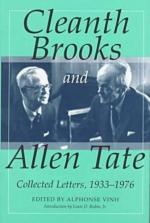|
This section contains 915 words (approx. 4 pages at 300 words per page) |

|
Despite [his] imposing record, Tate has not proved an original, seminal critic for his generation, as have Eliot, Richards, Edmund Wilson, and Kenneth Burke. His earlier work, both in the Fugitive articles and in his free-lance period in New York, was directly dependent on Eliot. When Eliot's influence waned, the original stimulus of Ransom reasserted itself, now strongly aided by that of Brooks and Warren, who were synthesizing the new critical doctrines. Finally, when he became a convert to Roman Catholicism, Tate moved back toward Eliot, while his further debt to M. Jacques Maritain was both evident and acknowledged.
What has characterized Tate's criticism from the first has been an apostolic fervor; and the firmness, often the dogmatic assurance, of his missionary zeal has inspired a large discipleship. He has, like no other American critic of his time, compelled attention. In an era gone largely over on its...
|
This section contains 915 words (approx. 4 pages at 300 words per page) |

|


